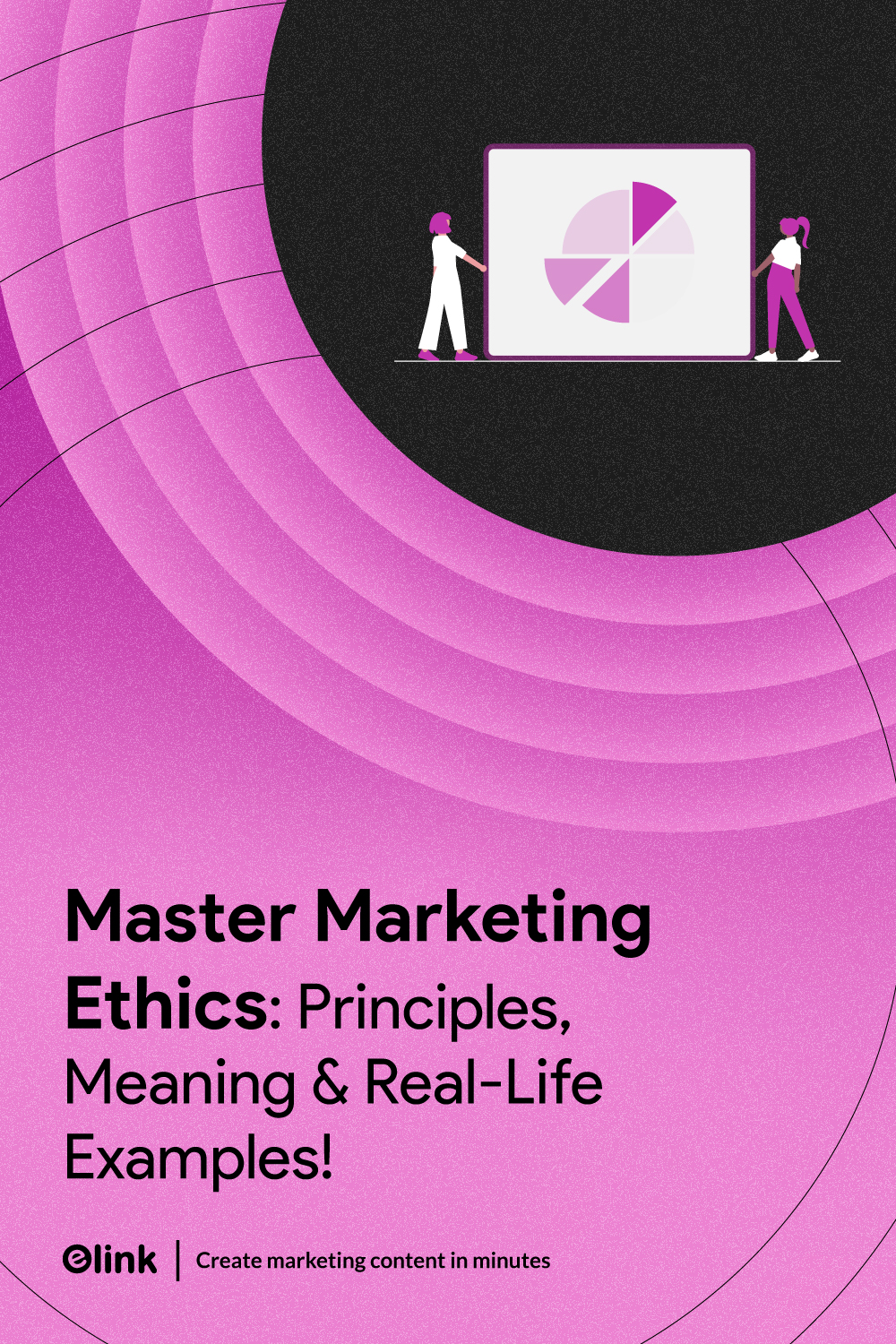The word ‘ethics’ or ‘ethical’ is one that we hear being tossed around now and then. It pops up during arguments, debates, and discussions, and seems to be a major element governing our lives.
So, what does ethics mean?
Ethics is a set of moral principles that dictate a person’s behavior and actions. It is based on the standards of right and wrong and prescribes what one should do in terms of rights, obligations, freedom, fairness, or virtues.
Simply put, ethics are what is perceived as right and wrong or good and bad.
Any group or organization of people could have its own specific set of ethics. That’s why we hear terms like ‘business ethics’, ‘environmental ethics’, ‘work ethics’, ‘medical ethics’, and so on.
In this blog, we will have an overview of marketing ethics and its importance.
So, let’s jump right in!
Read More 👉 35+ Email Marketing Best Practices You Need To Know Now
What Really is Marketing Ethics? (Meaning)
Marketing ethics refers to the basic principles and standards that define acceptable conduct within marketing practices. This means promoting products and services to consumers in a socially responsible way.
To foster a sense of honesty, fairness, and responsibility within the marketing industry is the primary goal of marketing ethics.
Speaking of goals, we all know that the primary goal of a business is to earn profits. For this reason, in a marketing economy, businesses act in a way that profits from their sole interests.
Many a time, companies follow deceptive and unjust practices to achieve their goals.
How is that fair? Merely functioning for profits and doing things that benefit only their interests feels wrong. More importantly, it causes harm, directly and indirectly, to everyone involved.
It isn’t fair if it is only fair to one side.
Now, let’s take a look at the importance of marketing ethics and why you must follow them.
Turn your marketing values into stunning, shareable web pages with elink.io!
Why Must You Follow Marketing Ethics? (Importance)
Whenever we talk about marketing ethics, people tend to associate it with restrictions and expenses. They focus on how the ethics of marketing constrain corporate marketing activities and create an increase in marketing costs.
What they forget is that marketing ethics brings with it the development of business, strong relationships with customers and society, legal support, and a positive image. That’s the whole package of benefits any business could ever ask for!
Let’s lay that out in detail so that it’s easier to understand. Here are a few points telling the importance of marketing ethics and why you must follow them:
Supports Basic Human Needs
We are all human beings, and we all want to be treated equally and with respect. This point alone should make you want to follow marketing ethics.
Satisfying basic human needs is at the core of ethical practices. Whether we are customers or stakeholders, or employees, we all deserve our rights.
Following marketing ethics ensures that all its people are satisfied equally without any discrimination or bias.

Improves Credibility and Trust
An organization that is known for following ethical marketing practices will always be in the good books of people.
Not only will people have a great image of your company, but they will also always believe in your endeavors. Such a strong reputation not only cements credibility but also fosters trust amongst its people.
Before you even know it, more people will want to be associated with your company, which will indirectly contribute to the improvement of your business. Following marketing ethics can really make you feel good.
Read More About 💌 How To Create A Press Mentions Page To Gain Customer Trust?
Impacts Society
The power you have as a marketer is huge because what you advertise influences society far more than you can ever imagine.
Your marketing practices can have a positive impact on society if you take a step in the right direction. That kind of power also has the potential to manipulate society and create a negative and insecure environment.
Focusing more on providing goods and services people want and promoting socially responsible advertisements can go a long way in bringing about a change.
You must follow the ethics in marketing to ensure that the power that you have doesn’t take a wrong turn, because with great power comes great responsibility!
Improves Employee Retention
Every employee wants to work for an organization that treats its employees with respect, dignity, and kindness. These are some of the core values associated with being ethical.
A good company that takes its ethical marketing practices seriously creates a healthy and positive environment for its employees. This makes them feel safe and valued and therefore less likely to change jobs. Not only that, they will also feel highly motivated to perform better.
Don’t forget, a happy employee will be a loyal employee!
Pro Tip 💡 Promote your ethical marketing campaigns visually — create engaging landing pages in minutes with elink.io.
Ensures Long-term Benefits
Companies that employ ethical marketing practices age like fine wine. Why?
They might start off on a rocky road, but over the course of time, their business develops, their customer base increases, and their image is almost picture-perfect!
This is because being socially responsible creates a sense of safety and belief that a company is not only working for itself, but also for the betterment of society. While short-term benefits, as the name suggests, will only last for a short time.
Sure, ethical marketing practices may not be on the cheaper side (and for good reasons!), but they reap benefits that every company strives to achieve.
Might take longer, but definitely worth the wait!
Clearly, everything seems to be on the side of marketing ethics. So, what exactly constitutes these marketing ethics?
Scroll down and let’s explore!
List of 11 Marketing Ethics You Must Follow (Principles)
There is no hard and fast list of rules for marketing ethics. They are more of a philosophy and less of a marketing strategy that aims to promote a socially responsible way of marketing.
However, there is a set of general principles that companies follow to make sure that their marketing strategies are ethical.
We have written down for you 11 marketing ethics that you can follow in order to be a responsible professional.
1. Be Honest
Honesty is the best policy! Cannot say it any better than that.
This means that there are no exaggerations, partial truths, selective omissions, or misleading information about your products and services. Everything remains just like it is advertised.
Being honest and truthful about your business dealings says a lot about the professionalism of your business as a socially responsible one.
2. Ensure Transparency
A good company is always open. There’s no game of hide-and-seek there.
To be transparent means to create a spirit of openness in the practice of marketing through proper communication and disclosure of information. It is always best to provide the consumers with the maximum amount of information about the product or service, its usage, and its safety concerns.
Transparency also applies to the employees and stakeholders of the business.
See-through that all rules related to transparency are followed at all times.
Check These 📌 What are the Best SaaS Marketing Strategies for Fast Growth
3. Respect Customer Privacy
As marketers, you often gain access to collect and store a lot of data concerning your consumers. This sort of information is something consumers are allowing you to access based on their trust in your company.
Since data privacy is the hottest topic in the current world of corporations, the last thing you want to do is breach their trust by being unethical and selling that information. That’s why your marketing ethics must prioritize privacy issues.
Make a commitment to the protection of consumer privacy and respect it.
4. Follow Fair Practices
As human beings, we all deserve to be treated without any bias or discrimination. That’s why fairness is one of the most valued marketing ethics. It constitutes justice, equal treatment, inclusivity, tolerance, and open-mindedness.
Marketers must ensure that they are fair in all their dealings and refrain from misusing of their powers to gain any quick profits. They must see to it that employees are compensated well and customers are not manipulated.
5. Be Responsible to Society
Advertisements often tend to be unethical in promoting negative stereotyping and instilling insecurity, thereby encouraging an unhealthy environment in society. Being socially responsible requires you to refrain from such misleading and negative campaigns.
Yourmarketing strategieshave the power to influence people, their perceptions, and create an impact on society. The responsibility lies with you to make a difference by going in the right direction.
Use your platform to create awareness as you promote your product.
Read More 📜 Permission Marketing: A Proven Strategy for Email Growth
6. Follow the Law
A company that does not play by the legal rules will not look good in front of its consumers or the government
There are government regulations and laws, and guidelines created by consumer protection bodies that are expected to be followed by all businesses. These are established with the aim of protecting consumers and improving consumer welfare, which must also be your aim.
Your marketing strategies should be law-abiding and must fulfill all necessary legal rules and regulations. This is a basic level of ethical standard that needs to be followed.
Remember, no one is above the law, and no one can get away from the law.
7. Maintain Integrity
As a marketer in a competitive environment, you will be faced with multiple dilemmas regarding money-making and ethical practices. Your strong convictions in doing the right thing in a situation that prompts you to do otherwise will go on to show that your priorities are not just profits.
Maintaining integrity essentially means that you demonstrate a personal level of integrity and ethical values.
Fighting for your beliefs and doing the right thing even under pressure goes a long way in establishing a sense of trust with your customers and employees.
8. Commit to Sustainability
Social responsibility is the essence of marketing ethics. It is basic ethics to commit to human rights and the environment. This requires you to promote the environment and sustainable practices where people are not exploited in any way.
Make sure that your marketing strategies are not causing harm to the environment or is a product of human exploitation.
9. Ethical Pricing
Adopting predatory pricing strategies to increase market shares and profits will lead to consumers losing trust.
Marketing ethics do not let you engage in such foul play.
Pricing strategies should be based on costs and demand and supply, and should not in any way lure consumers into paying more.
🚀 Ready to take your ethical marketing from idea to impact? Start creating visual stories your audience will actually care about — with elink.io
10. Keep Your Promises
Working in the marketing industry requires you to promote your products in a persuasive manner.
You must be worthy of trust. For this, you must make sure that you share factual information and not make exaggerated claims or false promises.
Only make promises that you can keep.
It is as simple as that!
11. Be Kind!
Your customers, stakeholders, and employees all have one thing in common: they are human beings with feelings and emotions.
Being kind is one of the core values of ethics. It is so simple, yet so powerful. It is the best way to establish a bond or relationship with the people around you.
Marketing ethics revolves around this sort of empathetic feeling.
Simple to its core and truly rewarding, being kind costs you nothing.
Conclusion
This blog has gone on and on about the importance of ethics in marketing. The key takeaway here is that marketing ethics is the wisest route to success.
It may start off as a bumpy ride, but once your business is out there doing good things for the people and the environment, there is no stopping you from growing and reaching new heights!
We hope this blog has helped you find ways to incorporate more ethical practices in your marketing operation.
Go ahead and make a difference!
FAQ’s
1. Why is marketing ethics important?
Marketing ethics sets the foundation for trust between your business and your audience. When you follow ethical practices, you build credibility, improve customer loyalty, and create a positive impact on society.
2. Can you give examples of ethical marketing practices?
The best practices for ethical marketing are honesty about product features, respecting customer privacy, avoiding misleading ads, practicing fair pricing, and promoting inclusivity. Even keeping your promises to customers counts as a marketing ethic!
3. What is the difference between ethical and unethical marketing?
Ethical marketing focuses on honesty, transparency, and fairness. On the other hand, unethical marketing includes exaggerated claims, manipulating customers, or hiding important information.
4. How do businesses implement ethical marketing?
Businesses can implement ethical marketing by training teams, establishing transparent policies, and considering the social impact of campaigns. Ethical practices help maintain long-term credibility and trust.
Keep Reading & Learning 📚
How to Build a Content Marketing Funnel that Actually Converts
How To Create Marketing Landing Pages in Easy Steps
Content Marketing Plan: What It Is and How to Create One
Experiment Marketing: Learn How to Optimize Your Next Campaigns!
10 Powerful Newsletter Marketing Strategies!






